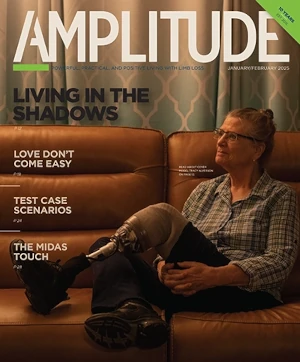The February 2015 issue of Prosthetics and Orthotics International (POI) is devoted to the prevention and management of foot complications in people with diabetes and offers an interdisciplinary care perspective. The following is a summary of three articles that focus on pedorthic and orthotic interventions:
Wound Management of Chronic Diabetic Foot Ulcers: From the Basics to Regenerative Medicine
A systematic literature review was conducted about the management of diabetes-related foot ulcers. The review showed that chronic nonhealing foot ulcers occur in about 15 percent of patients with diabetes. Risk factors that contribute to this impaired wound healing include peripheral neuropathy, peripheral arterial disease, limited joint mobility, foot deformities, abnormal foot pressures, minor trauma, a history of ulceration or amputation, and impaired visual acuity. With the current treatment for nonhealing diabetic foot ulcers, a significant number of patients require amputation. The authors concluded that patients with diabetes-related foot ulcers are optimally managed by a multidisciplinary integrated team. Offloading and preventative management are important. Dressings play an adjunctive role. Further, there is a critical need to develop novel treatments to improve healing of diabetic foot ulcers. The goal is to have wounds heal and remain healed.
Pedorthic Management of the Diabetic Foot
A literature review conducted by Dennis Janisse, CPed, and Erick Janisse, CO, CPed, concludes that pedorthic modalities may be used in the treatment and prevention of diabetes-related foot wounds and other complications. Their article is based largely on review of previously published research and scholarly articles, augmented by the more than 60 years of pedorthic and orthotic clinical experience of the authors. According to the abstract, the article exhibits why and how pedorthics plays such an important role via modalities such as footwear, shoe modifications, custom foot orthotics, and partial foot prostheses.
Orthotic Management of the Neuropathic Foot: An Interdisciplinary Care Perspective
A literature review was conducted regarding clinical concepts associated with the orthotic management of neuropathic foot issues. Given the multifactorial nature of the neuropathic foot, treatments must be multifaceted and patient-specific to effectively address the underlying disease processes, the authors wrote. They concluded that patients with neuropathic foot benefit from an interdisciplinary care approach that engages physicians, wound care practitioners, and orthotists to treat and manage systemic and local problems. Addressing this pathology through interdisciplinary care may positively affect the patient’s health status while lowering associated healthcare costs through improved treatment efficacy.



